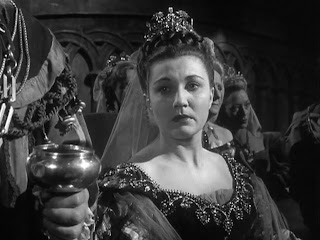"The world is stirring in very strange ways. Maybe this is the century for it. Maybe that's why it's so troubled. Other centuries had their driving forces. What will ours have been when men look back? Maybe it won't be the American century after all... or the Russian century or the atomic century. Wouldn't it be wonderful... if it turned out to be everybody's century... when people all over the world - free people - found a way to live together? I'd like to be around to see some of that... even the beginning."---Mrs. Green to Phil (Gentleman's Agreement, 1947)
I was reluctant to see this film, as I have never been one to enjoy a film of moralizing and platitudes. I knew that the purpose of this film was to expose anti-semitism, and I was afraid this would turn into another "The Life of Emile Zola." Much pontificating without plot or purpose. But I didn't give credit to the fact that ten years have passed since that film, and therefore Darryl Zanuck was able to craft a much subtler, worthier film. This film is a story about average people first, and a political piece second. It's why the message manages to be heard. Zanuck doesn't hit you over the head with his point, but he sneaks it into the lives of his characters. Though sometimes redundant and choppy, I appreciated this film--especially when I discovered the interesting
historical ramifications that occurred years later.
 |
| Mrs. Green speak to her son, Phil |
The Plot
Philip Schuyler Green, played by Gregory Peck, is a widowed journalist of some success, who has just moved to New York City with his mother and young son to pursue a new job with a liberal magazine, Smith's Weekly. His publisher, John Minify, wants him to do a story on anti-semitism that will "blow the lid off it." Phil is disappointed, and feels that it has been done before, but he allows Minify to bring him to his home for a party where he meets Minify's niece, Kathy, a young socialite and divorcée who was actually the driving force behind Minify's story. Kathy, played by Dorothy McGuire, and Phil hit it off right away and begin dating.
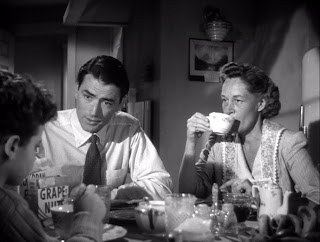 |
| Phil and his family |
Phil then agrees to do the story once he decides on the perfect angle: he will pretend to be Jewish.
Minify is thrilled and agrees to keep Phil's true faith a secret from the rest of the magazine. But Kathy is confused that he might really be Jewish and concerned for him, though she eventually agrees to play along. The two fall in love and decide to marry. Meanwhile workers at the magazine have found out Phil is Jewish. His new secretary, Elaine Wales, confesses that she only got this job after she changed her name from Estelle Walofsky. Phil tells Minify who then changes their hiring policy. But when Wales discovers the changes, she confesses to Green that she is worried that this will allow them to let in a "kikey" Jew.
 |
| Phil and his secretary, Elaine |
After suffering through discrimination at both his apartment building and workplace, Phil talks to Kathy who asks that they be able to tell her sister Jane about the ruse before their engagement party at Jane's house in Connecticut. Phil wonders why it matters, and Kathy says that she doesn't want any confusion. At the same time his mother, played by Anne Revere, has been suffering from heart problems. When Phil asks the doctor if she should see a specialist (who happens to be Jewish) the doctor asks if he is sure he wants to see someone who might raise his prices and behave sneakily. Soon after, Phil's best friend Dave Goldman, played by John Garfield, arrives in New York having finished his tour in the army. He has gotten a great job, but needs to find a home so he can bring his family over from California. He stays with Phil and advises him on being Jewish while searching for a home.
 |
| Phil tells Kathy the plan |
Phil and Dave meet up with Anne, the style editor at Phil's paper who is attracted to Phil. Dave is insulted at dinner and almost punches another customer for calling him a "kyke." Anne begins spending time with Phil and Dave, and she is one of the few people who is completely unprejudiced, though she doesn't know the truth about Phil. Kathy and Phil continue to fight, espeically when she asks him again not to bring up his article at their engagement party. She finally agrees with Phil and tells her sister that Phil will not hide his article. Phil and Kathy make up, and he goes to Darien, Connecticut for the party. He is pleasantly surprised by how supportive everyone at the party is, unaware that Jane has screened the guest list and only invited those neighbors she knows won't cause a problem. Kathy shows Phil her cottage nearby, claiming that she never lived in it with her ex-husband as she only wanted to live there with someone she loved. She says that she and the house have been waiting for Phil.
 |
| Kathy, Phil, Dave, and Anne |
Two days before the wedding, Anne tells Phil and Kathy that the swanky hotel they were planning on staying in for the honeymoon is "restricted" and therefore won't allow Jews. Phil's mother has another attack soon after, and Kathy stays to care for her while Phil goes up to the hotel to see if they really won't let him in. When he asks the hotel if they will refuse him his room because he is Jewish, they insist that his room is not available and ask him to leave.
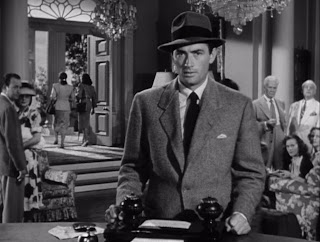 |
| Phil is rejected at the hotel |
Phil returns to find that Dave is considering giving up his new job because he cannot find a home for his family. After Dave leaves he asks Kathy why she didn't volunteer her empty cottage. Kathy confesses that she is worried about trouble from the neighbors should they learn a Jewish person is living next door. She mentions that Darien has a "gentleman's agreement" about selling their homes to Jews. Tommy, Phil's son, interrupts in tears and says he was chased by the other boys and called a "dirty yid" and "stinking kyke." Kathy hugs him and tells him not to worry because it isn't true, but Phil pull him away and calms him. He then lectures Kathy on comforting Tommy not by telling them prejudice is wrong, but by confirming it's okay because he isn't Jewish. He says he has learn that the "nice people" continue prejudice by not protesting it. Kathy says she is grateful she doesn't have to deal with prejudice and is tired of feeling sorry for it. They decide to break up.
 |
| Kathy embraces Tommy |
Dave and Anne come back from going out on the town, and Phil tells Dave what happened with Tommy. Dave tells him he can quit now, because he finally understand the worst of prejudice. Phil writes and prints his story, "I Was Jewish for 8 Weeks," and announces that he is returning to California. Anne realizes he is upset about his break-up with Kathy and asks him over for drinks. Meanwhile Kathy asks Dave to meet her at a restaurant to talk about her break-up with Phil. She tells him that she's not prejudiced, and hates thinking that she is. She tells Dave about a party she just attended where someone told a racist joke, and no one said anything. It made her feel sick inside. But then Dave continues to ask her, "but what did you do?" Kathy realizes that Phil was upset with her because even though she wasn't prejudiced, she wouldn't fight prejudice along with him. Dave tells Kathy that she's not a bad person, and that a man just wants to have a wife that will stand beside him during the rough times.
 |
| Kathy and Dave have dinner |
Anne and Phil have a drink at her apartment, while Phil confesses what happened with Kathy. Anne tells him that he should want a wife who will raise his children the right way, with the same morals he possesses. "Are you proposing, Anne?" Phil asks. Anne replies that she is, but it is clear Phil does not care for Anne the way he does for Kathy.
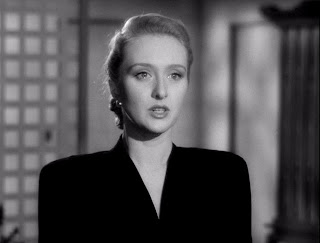 |
| Anne proposes to Phil |
When he arrives home his mother is reading his manuscript, and she stops to tell him how proud she is of him. Dave comes in and calls his boss in front of him, saying that he has finally found a house. He reveals that Kathy has agreed to rent him her cottage, and she will live next door at her sister's house to help challenge the prejudice there. Phil goes to her apartment and embraces her.
 |
| Phil comes back to Kathy |
The History
Post-World War II America was doing its best to forget the horrible images of genocide and racial hatred. In any event, prejudice of that kind was a European problem, best underscored by the continuing reports of the Nuremberg Trials. Americans were the conquering heroes, and now all the problems were over. But America had its own brand of prejudice, and in 1946 author Laura Z. Hobson wrote a book about a journalist who pretends to be Jewish in order to expose prejudice in America. The book received rave reviews, and was an instant best-seller.
 |
| An important Jewish executive tells Minify to "leave it alone." |
It is a historical irony that in a time when the majority of Hollywood's powerful producers were Jewish immigrants, the myth of the homogenized American ideal was first propagated. Jews didn't exist in film at all, or if they did, they existed only as a gross parody. Scripts were purged of references to other ethnic identities or diversity. So despite the success of a book like Hobson's Gentleman's Agreement, most of the Hollywood big-wigs refused to touch it, and even tried to persuade Darryl Zanuck to shelve the project, claiming it would stir up too much trouble. Zanuck was undeterred, and even added a scene to the film (when Phil first meets the members of his paper) that mirrored Zanuck's issues with the studio bosses. He also received flack from various Catholic groups, claiming that the leading lady couldn't be a divorced woman.
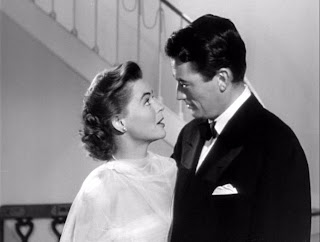 |
| Gregory Peck and Dorothy McGuire |
Zanuck himself was not Jewish, although with his foreign sounding name was often mistaken as such. There is a rumor that he was inspired to attempt the project when refused membership to the elite Los Angeles Country Club after being mistaken as Jewish. He gathered a strong cast, headed by new heartthrob Gregory Peck, and a relatively new Broadway director, Elia Kazan, fresh off A Tree Grows in Brooklyn. Popular Jewish actor John Garfield agreed to play a much smaller part in the film, just to be a part of it.
 |
| Darryl Zannuck and his contemporaries |
The film opened to rave reviews, and Zanuck began winning awards for the "advancement of democracy" and for making "strides against intolerance." But Zanuck wanted to make one point clear, insisting that, "I would like to emphasize that Gentleman's Agreement was primarily planned for entertainment rather than for any social message. I believe this is the chief reason for the success of the film." While the message was important for Zanuck, he strongly believed that films were meant to entertain first if they had any hope of reaching people with a message.
 |
| Phil and his mother and son |
Gentleman's Agreement wasn't the only film about anti-semitism that year; another picture called Crossfire, produced by RKO, was also nominated for an Oscar for tackling the subject in a film-noir. But before they could congratulate themselves, both the director and producer were cited for contempt of Congress for not testifying before the House of Un-American Activities Committee or HUAC (they would later become part of the Hollywood Ten). The studio refused to promote the film, and both men were fired. In the wake of the scandal, new RKO head of production Dore Schary pushed his lighter, less controversial films. Films like The Bachelor and the Bobby Soxer, The Farmer's Daughter, and The Bishop's Wife, were all to be promoted throughout the year. Editor of Daily Variety agreed with Schary, blasting Hollywood to start "making pictures for the public, not the Academy." He claimed that films were getting too artsy, and that the advent of television was starting to drain the movie-going audiences. Hollywood would have to "lighten up" if they wanted to continue to attract patrons.
 |
| Protesters for the "Hollywood Ten" |
Just a few days before the awards, Daily Variety released a poll predicting the results, ended up with a about an 83% accuracy. Despite the lack of suspense, the public was excited going into the awards. ABC began its fourth annual radio broadcast to 45 million listeners, and five thousand fans waited outside the Shrine Auditorium to listen to the speakers blast a medley of Oscar winning songs and catch a glimpse of the giant birthday cake--Oscar turned 20 that day.
 |
| Edmund Gwenn as Santa Claus on Miracle on 34th Street |
This year heralded a new innovation; the Academy decided to jumble the awards, instead of awarding the Technical Awards first before moving onto the major awards. The Academy claimed that this was to make each award equally important; Daily Variety quipped that it was in order to keep "a rush to the exits when the big awards are made" from happening. Tweety and Sylvester in "Tweetie Pie" beat out the perennially winning Tom and Jerry for the Cartoon Award, and Edmund Gwenn won the Best Supporting Actor award for playing Santa Claus in Miracle on 34th Street, after which claiming that "Now I know there's a Santa Claus."
 |
| Ingrid Bergman awards James Baskette the Oscar |
Almost all the Art Direction and cinematography awards were given to foreign films, prompting Academy President Jean Hersholt to suggest that "an international award, if properly planned and carefully administered, would promote a closer relationship between American film craftsmen and those of other countries." Interestingly, the now notorious Disney film Song of the South (google it, seriously) won both Best Song, "Zip-a-Dee-Doo-Dah," and a special Oscar for "Uncle Remus" played by James Baskette, making him the first male African American actor to receive an Oscar, albeit a non-competitive one. Hedda Hopper wrote in her autobiography that she had suggested it as a great humanitarian move, as members had apposed it because Baskette played a slave and, according to Hopper, "The feeling was that Negroes should play only doctors, lawyers, and scientists." Perhaps the biggest surprise of the night was when Loretta Young won for Best Actress in The Farmer's Daughter beating out heavy favorite Rosalind Russell. Frederic March actually started to read Russell's name and then started again when he saw Young's instead. Russell took the disappointment well, and reportedly told her husband, "We're going to the party afterward anyway. I won't be bitter."
 |
| Celeste Holm wins his Oscar |
Gentleman's Agreement was nominated for eight awards, and won three of them, Best Supporting Actress, Best Director, and Best Picture. Celeste Holm was sitting in her seat, knitting, when she won, knocking her ball of yarn off her lap and under a few tables. At the podium she exclaimed, "Thank you for letting this happen. I'm so happy to be part of an industry that can create so much understanding in a world that needs it so much." Zanuck hosted the big after-party and everyone congratulated themselves on a good year, although the Hollywood Citizen-News suggested the Academy go all out with a variety show, saying, "Why not have some big production numbers, too, a few hundred dancing Oscars, say. Or a couple of bird acts, maybe."
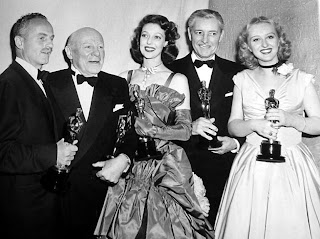 |
| From left: Darryl Zanuck, Edmund Gwen, Loretta Young, Ronald Colman, and Celeste Holm |
While Gentleman's Agreement has not maintained the popularity it had in 1947, it did pave the way for socially conscious films by proving that they could be commercially viable. However, there were serious consequences that none of the people involved could have predicted. Based on the HUAC's tendency to associate Judaism with communism, in the early 1950s Elia Kazan, Darryl Zanuck, John Garfield, and Anne Revere were all called to testify. Celeste Holm tried to protest the treatment of those on the Hollywood Blacklist, but her lawyer warned her to stay out of it. According to Celeste Holm, he said "Darling girl, you're only going to get yourself in trouble. People are going to think you're a Communist." To which she replied, "It isn't illegal to be a Communist!" Her lawyer laughed and said, "People have forgotten that."
 |
| House of Un-American Activities Committee |
Darryl Zanuck ultimately had to succumb to the pressure to fire of the Hollywood Ten who refused to testify, Ring Lardner Jr. Anne Revere refused to name names before the committee in 1951, and did not appear in films afterwards for another twenty years. Elia Kazan was subpoenaed in 1952, and while he at first refused to name names, upon his second hearing he caved and began to name people, a decision that has branded him a traitor to many Hollywood historians. He refused to apologize in later years and stood by his decision, and has even mentioned that Gentleman's Agreement is his least favorite film because of its sentimentality and forced romantic elements. John Garfield, a popular and well regarded actor, freely admitted his own left-wing past, but like Anne Revere, refused to name names. For the next year, Garfield was blacklisted in Hollywood, and the FBI followed his every move, even attempting to get him to testify against his wife. The night before he was to appear at his wife's hearing, Garfield suffered a heart attack and died at the age of 39. Many believed he died of a broken heart.
 |
| John Garfield as Dave fights in a restaurant |
While the film may have faded in popularity with time, its message of tolerance is an important one. Even more important perhaps is the aftermath of the film, and an audience that wasn't really paying attention.
The Verdict?
There are many things I found fascinating about this film, and not all of them involve staring at Gregory Peck. Just most of them---kidding! Does that lighten the mood or undermine it?
 |
| Gregory Peck |
Yes, Gregory Peck is very pretty. But more importantly this film does very interesting things with the subject of prejudice. As a modern viewer, I was struck by two ideas. One, that it was strange to see a film about prejudice that involves average people in an upper middle-class environment. I think these days a film about prejudice would inevitably be about African Americans, or maybe Native Americans. Even Asian Americans. And isn't it interesting that the year this film wins is the year
Song of the South gets a special Oscar? Anyway, all this leads me to my second point. Any film that discusses anti-semitism in today's world has to involve the Holocaust in some way.
 |
| Celeste Holm with Gregory Peck |
Now I'm sure you could throw several movies at me to make your point that a modern day film about anti-semitism doesn't have to involve the Holocaust. And you'd probably be right, because I just don't have enough background in that kind of film to be sure. But generally in the wake of Jon Stewart, Jerry Seinfeld, Barbara Streisand and Woody Allen, I think a film like
Gentleman's Agreement just can't be made. One could make the argument that we've gotten past it, and anti-semitism is a thing of the past. Do I think this film's message still applies? Absolutely, but I'll get to that in a second.
 |
| Publicity still from Gentleman's Agreement |
What I find so fascinating about this film is that it was filmed and released in 1947, just two years after the end of World War II. They were in the midst of the Nuremberg Trials. And yet there is not one reference to Hitler or the Holocaust. Even the character of Dave Goldman, an
Jewish officer returning from the war, does not mention it. It's as though no one has heard of concentration camps, when I know that wasn't the case. I do know that the message of the Holocaust hadn't really hit home, and wouldn't for several years. But in a time when the Holocaust is almost interchangeable with the phrase "anti-semitism" and when Hitler is plastered on every protest poster, no matter what the protest, it is mind boggling for me to find a film about Jewish prejudice and not see references to any of that.
 |
| Phil and Kathy fight |
For me, this makes this film all the more powerful. Because even though it is about anti-semitism, ripped of it's biggest modern day standard, I am able to focus more on the issue at hand. This film could apply to any number of prejudices. Now I know this film is criticized because it deals with white, middle to upper class Americans. But I think that just makes this film applicable to a whole host of people who believe themselves "above" racial prejudice. How many times have you heard someone make an inappropriate joke or comment, and kept silent? I know I have. I found myself squirming in my seat just as Kathy does, knowing that while I don't agree with prejudice, I'm comfortable in the knowledge that I don't have to face it.
 |
| Kathy leaves Phil |
Despite all of Gregory Peck's posturing, moody speeches about equality and what's "right," my favorite moments in this film don't come from the fighting crusader, but from some of the quieter characters. Dorothy McGuire's face as she stutters, "Jewish? But you're not Phil--are you?" manages to convey fear, confusion, and a desperate attempt to "be cool with it." John Garfield's quiet insistence to Kathy of, "But what did you
do about it?" is incredibly powerful. But the best line in this movie comes when Phil and Anne are sitting at a cocktail table having a drink with a co-worker who has inadvertently made an anti-semitic remark. When called on it, he anxiously backpedals, before becoming defensive, saying "Why, some of my best friends are-" Celeste Holm cuts him off and says, "I know dear, and some of your other best friends are Methodist, but you never bother to say it."
 |
| But some of my best friends are Jewish! |
The message of this film is that prejudice will always exist unless people decide not to give into it. I found myself constantly thinking, "I do that," or, "I've seen friends do that." Between that, and its interesting historical connections, I found I enjoyed this film. And as a reflection of post-war America, I think it is certainly an unusual one. If I told you that you were about to watch a film about anti-semitism from 1947, this is not the movie you would expect. In a good way.
















